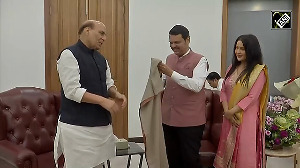The one message that I took from the Survey was that the new UPA government was open to even some of the more radical reform ideas that have been floating around for a while, but never seemed to make it past the political filters.
I did not realistically expect to see many of these in the Budget, but still felt that the speech would broadly endorse a series of reforms. But, going beyond that to the nitty-gritties of the revenue and expenditure announcements, I did not expect to see very much tinkering. The economic situation is simply too delicate to warrant bold gambles with either.
In the event, Mr Mukherjee apparently decided that the nitty-gritties were the more important aspect of the exercise. Beyond some general references to long-term challenges, the speech itself had very little of the sense of occasion that one has come to expect from a first-year Budget. That, to me, was certainly a disappointment, particularly on measures that were firmly within the domain of the finance ministry.
Disinvestment received several lines of text, worthy of a big initiative like the Rs 25,000 crore (Rs 250 billion) mentioned in the Survey, but all it got was a little over Rs 1,000 crore credit for the year.
Likewise, the speech was silent on the increase of the FDI cap in insurance, which probably means that the issue will continue to hang fire. The tax reforms that were announced, such as the abolition of the Fringe Benefits Tax, the Commodities Transactions Tax and the surcharge on the personal income tax (along with higher thresholds of liability) are all very welcome, but are hardly earth-shattering.
The one dramatic fiscal measure was the adherence to the original timeline of April 2010 for the implementation of the Goods & Services Tax (GST), which most people expected would be postponed.
Even with a slow beginning, efficiently implemented, this has the potential to dramatically raise revenue collections by providing producers who are out of the net an incentive to get themselves into it. But, the benefits will only accrue from next year.
On the expenditure side, as expected, a significant amount of Rs 39,000 crore (Rs 390 billion) was provided for the National Rural Employment Guarantee Scheme, which was given much credit for the UPA's electoral victory. There are also significant, but not dramatic, increases in commitments to rural roads, electrification and housing.
The campaign promise to make low-priced foodgrains available to poor households has also been promised under the framework of a National Food Security Act. But, beyond these, the Budget speech is largely a listing of moderate increases or small new allocations for a variety of programmes.
The fiscal numbers clearly indicate that the finance minister simply did not want to take any chances. For example, the estimated increase in tax revenues is a mere 1.8 per cent over the Revised Estimates for 2008-09, a far cry from the high buoyancy of just a couple of years ago.
Even in difficult economic conditions, this seems rather pessimistic. Even with a 45.8 per cent increase in non-tax revenues, some of which will come from spectrum auctions, total receipts increase by less than 10 per cent. Compared to this, total expenditures are estimated to increase by about 13 per cent, taking the fiscal deficit to 6.8 per cent of GDP.
While this will certainly cause concern, it must also be seen as a conservative number, with very little prospect of going beyond. The Survey did mention the need to amend the Fiscal Responsibility and Budget Management goalposts to accommodate business cycles. 6.8 per cent may violate even those modified targets, but the speech was quite explicit in stating the government's intention to work this out.
There were three things in the Budget that I liked. The first was the desire to change the principle of the fertiliser subsidy from the gross quantity of fertiliser to the amount of nutrient.
Effectively implemented, it will begin to address the critical issue of soil quality degradation which the existing policy has reinforced. The second was the additional incentive to farmers who meet their obligations to banks on time. If we are going to have waivers, at least let us create incentives in the opposite direction as well.
The third was the limited investment tax credit for investments in cold chain, storage facilities and the like. Again, properly implemented with facilitating regulatory reforms and inter-state co-ordination, this will help to fill a big hole in the food economy.
Overall, as Budgets go, this one certainly scores in a realistic, house-keeping sort of way. But, its absence of a clearly articulated economic vision and strategy for the government detracts from its impact. I would have liked to see more of the Survey endorsed by and reflected in the Budget.
Subir Gokarn, Chief economist, Standard & Poor's Asia-Pacific. Views are personal.







 © 2025
© 2025